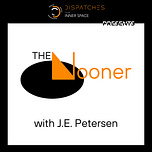This is the ninth post from The Nooner, a (very short) daily newsletter slash podcast that has its very own section within Dispatches from Inner Space.
To see the first post, which doubles as an explainer, click here.
People are complicated
They are good and bad at the same time. Most of their decisions are, at least on some level, well-intentioned. When people do bad things, it’s often out of some perceived necessity, or genuine misunderstanding. Everybody wants to believe they are good at heart, even when they are doing the most villainous things.
Institutions, on the other hand, are not complicated like that. Any given organization has, by definition, a unifying purpose. It is a sociological machine that was built to meet specific ends. And this machine cannot properly function unless its internal objective is singular and consistent.
Insofar as this unifying objective can be judged as “good” or “evil,” the institution itself can be judged the same way.
In other words, any organized group of people (whether it’s a church, a corporation, a club, etc) is, in a sense, good at heart, or evil at heart.
Either way, there will be plenty of “good” people who are not without their vices, and plenty of “bad” people who are not without their virtues.
But the intents and actions of the people within an organization can rarely change the quality of its heart. Because, once again, that can only be determined by the existential purpose that animates it.
For instance, Coca-Cola. Plenty of great people work for that company. We can even safely assume that *most* of the people who work for that giant corporation are decent, well-intentioned, and generally virtuous.
But Coca-Cola is evil.
Not consciously, not volitionally, but directionally. Its modus operandi is to turn profit by selling sugar. When politicians started subsidizing corn to win votes in swing states (you can look that up, it’s true), Coke traded cane sugar, which is cheap, and bad for you, for high fructose corn syrup, which is cheaper, and much worse for you. People smarter and better informed than me have compellingly underlined the correlation between that and the dramatic rise in type 2 diabetes, among other things.
Does Coke know this? Does Coke care? Of course not! It’s not a person! It’s a villainous machine.
Let’s take another example.
A hospital.
Any given hospital undoubtedly employs some number of lazy bureaucrats, conniving insurance agents, and other seedy and obnoxious people who generally fail to make the world a better place.
But what is the core purpose of a hospital?
It might not always be successful, but the whole point of a hospital is to heal people. Which seems...I don’t know, different? Than Coca-Cola?
We could go on all day talking about other examples that could support the idea that institutions themselves can be classified as “good” or “evil.”
But does that mean this idea useful?
I think so, because in our ongoing struggle to increase good and decrease evil in the world, it’s easy to get caught up in witch hunts and giant slayings. Everyone loves to defeat a villain.
But, as I’ll argue to my dying breath, there are no true villains. There are no people who are generically evil.
On the other hand, there are plenty of institutions that *are* straightforwardly villainous. And you can fight against them and take them down and replace them with something better, without demonizing and destroying all of the people inside of them.
This is harder! Much harder than canceling your ideological opponents. But if making the world a better place was as easy as that, we’d already be living in paradise.













Share this post